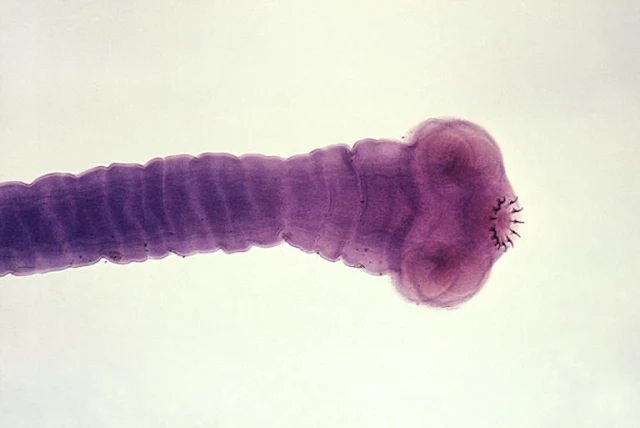Here is a revised version of the content, rewritten to be plagiarism-free and unique:
A little-known parasitic infection affecting the brain garnered attention recently when Robert F. Kennedy Jr., a presidential candidate, revealed his past struggle with it.
Neurocysticercosis is the name of this condition, caused by a brain infection linked to larvae from pork tapeworms. While rare, it results in the hospitalization of approximately 1,000 to 2,000 people in the U.S. annually. Symptoms of neurocysticercosis include seizures, headaches, blindness, blurred vision, dizziness, psychosis, or memory loss, and in severe cases, it can be fatal.
The infection typically occurs in the following way: individuals consume raw or undercooked pork that contains tapeworm larvae, subsequently shedding tapeworm eggs in their stool and contaminating food or surfaces due to inadequate hand hygiene. This contamination can lead to accidental ingestion of tapeworm eggs by themselves or others.
Once ingested, the eggs hatch into larvae, which can migrate from the intestine to the brain, forming fluid-filled cysts resembling tiny, clear balloons about a centimeter in diameter.
Dr. Clinton White, an infectious disease professor at the University of Texas Medical Branch at Galveston, described the eggs as "real sticky," emphasizing the importance of hand-to-mouth transmission.
Despite its significance, health care providers often poorly understand the condition, according to the Centers for Disease Control and Prevention, which categorizes neurocysticercosis as a "neglected parasitic infection."
Kennedy's campaign press secretary, Stefanie Spear, stated in response to a New York Times article that Kennedy contracted a parasite during extensive travel in Africa, South America, and Asia, which was resolved over 10 years ago.
In a 2012 deposition, Kennedy mentioned experiencing memory loss and mental fogginess two years earlier, with doctors attributing it to a worm that had entered his brain and died. Kennedy later confirmed in an interview that the infection was neurocysticercosis, acquired from eating undercooked pork.
Among tapeworms, pork tapeworms are commonly associated with brain infections.
In March, doctors in Florida published a case study of a 52-year-old man who developed severe migraines from neurocysticercosis, likely acquired from a lifetime of eating undercooked bacon.
Neurocysticercosis cysts can reside in the brain for five to 10 years. When they start dying, the body's immune response can cause epileptic seizures or life-threatening brain swelling. Some cases are asymptomatic.
In countries where pork tapeworms are endemic, neurocysticercosis accounts for about 30% of epilepsy cases, according to the World Health Organization.
While symptoms may resolve without treatment, some patients require seizure medications, steroids, anti-parasitic drugs, or surgery to remove cysts in severe cases.

